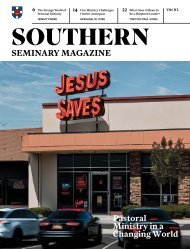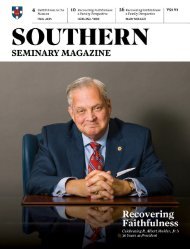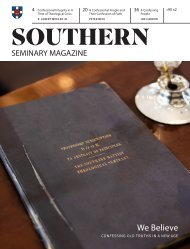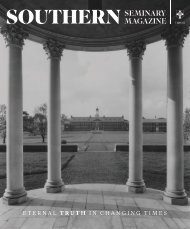Southern Seminary Magazine (Vol 90.1) The Light of Truth: Apologetics in the 21st Century
Create successful ePaper yourself
Turn your PDF publications into a flip-book with our unique Google optimized e-Paper software.
tim beougher<br />
about where he got his wife?” <strong>The</strong> student told me he<br />
had heard someone say if a Christian ever talks to you<br />
to ask <strong>the</strong>m that question, s<strong>in</strong>ce Christians can’t answer<br />
it. While I did answer his question, it was abundantly<br />
clear this student was just play<strong>in</strong>g games. He didn’t have<br />
a serious <strong>in</strong>tellectual objection to Christianity. He understood<br />
follow<strong>in</strong>g Christ would <strong>in</strong>volve him forsak<strong>in</strong>g<br />
his s<strong>in</strong>, someth<strong>in</strong>g he was unwill<strong>in</strong>g to do.<br />
2. An honest expression <strong>of</strong> doubt and confusion.<br />
Not all persons who raise questions are play<strong>in</strong>g games.<br />
Some ask legitimate questions because <strong>the</strong>y are genu<strong>in</strong>ely<br />
seek<strong>in</strong>g answers. Francis Schaeffer argues, “It is<br />
not more spiritual to believe without ask<strong>in</strong>g questions.<br />
It is not more biblical. It is less biblical and eventually<br />
will be less spiritual because <strong>the</strong> whole man will not<br />
be <strong>in</strong>volved.” Schaeffer goes on to say, “Christianity demands<br />
that we have enough compassion to learn <strong>the</strong><br />
questions <strong>of</strong> our generation.”<br />
We need to remember that faith <strong>in</strong> Jesus Christ is<br />
not a “leap <strong>in</strong> <strong>the</strong> dark” as it is sometimes described<br />
by skeptics. Faith <strong>in</strong> Jesus Christ is <strong>in</strong>stead a “step <strong>in</strong>to<br />
<strong>the</strong> light.” We have good reasons for believ<strong>in</strong>g what we<br />
believe. When people ask genu<strong>in</strong>e questions, we need<br />
to seek to answer <strong>the</strong>m. Paul Little quotes John Stott as<br />
<strong>of</strong>fer<strong>in</strong>g a wonderful balance: “We cannot pander to a<br />
man’s <strong>in</strong>tellectual arrogance, but we must cater to his<br />
<strong>in</strong>tellectual <strong>in</strong>tegrity.”<br />
General Pr<strong>in</strong>ciples <strong>in</strong> Respond<strong>in</strong>g to Questions<br />
First, don’t get defensive. Don’t be <strong>in</strong>timidated. After<br />
2,000 years, no one is go<strong>in</strong>g to come up with a question<br />
that will underm<strong>in</strong>e <strong>the</strong> Christian faith—and it’s not<br />
because people haven’t tried! God’s Word has stood <strong>the</strong><br />
test <strong>of</strong> time. Just because you do not have an answer to a<br />
question does not mean <strong>the</strong>re is no answer.<br />
Second, avoid an argument. Br<strong>in</strong>g<strong>in</strong>g people to faith<br />
<strong>in</strong> Christ is much more than merely giv<strong>in</strong>g an answer<br />
to <strong>the</strong>ir questions. You can “w<strong>in</strong>” <strong>the</strong> debate but “lose”<br />
that person if your demeanor and tone are sarcastic<br />
and argumentative.<br />
Third, answer questions <strong>in</strong> <strong>the</strong> right spirit—a spirit <strong>of</strong><br />
humility. First Peter 3:15 exhorts us to give answers to<br />
unbelievers “with gentleness and reverence.” One <strong>of</strong> <strong>the</strong><br />
classic def<strong>in</strong>itions <strong>of</strong> evangelism (from D. T. Niles) says:<br />
“Evangelism is witness. It is one beggar tell<strong>in</strong>g ano<strong>the</strong>r<br />
beggar where to get food.” This def<strong>in</strong>ition rem<strong>in</strong>ds us <strong>of</strong><br />
<strong>the</strong> importance <strong>of</strong> humility <strong>in</strong> our witness.<br />
Fourth, don’t be afraid to respond, “I don’t know <strong>the</strong><br />
answer to that question.” We see that even <strong>the</strong> apostle Paul<br />
could not unravel all mysteries. He testified <strong>in</strong> 2 Cor<strong>in</strong>thians<br />
12:2 (about whe<strong>the</strong>r be<strong>in</strong>g caught up <strong>in</strong> <strong>the</strong> third<br />
heaven was “<strong>in</strong> <strong>the</strong> body” or “out <strong>of</strong> <strong>the</strong> body”), “I do<br />
not know, God knows.” In my evangelism classes I have<br />
students practice say<strong>in</strong>g that three-word phrase “I don’t<br />
know,” s<strong>in</strong>ce many <strong>of</strong> <strong>the</strong>m have mistakenly thought it is<br />
an admission <strong>of</strong> failure to utter those words.<br />
Fifth, study to f<strong>in</strong>d answers. Not every question has an<br />
easy answer, and some questions cannot be answered with<br />
our limited knowledge. We don’t have full answers to every<br />
question because God hasn’t fully revealed his m<strong>in</strong>d to us<br />
on everyth<strong>in</strong>g. Deuteronomy 29:29 rem<strong>in</strong>ds us, “<strong>The</strong> secret<br />
th<strong>in</strong>gs belong to <strong>the</strong> Lord our God; but <strong>the</strong> th<strong>in</strong>gs that are revealed<br />
belong to us …” Not every question has an easy answer<br />
but seek to learn answers to common questions people ask.<br />
Seventh, if possible, present <strong>the</strong> entire gospel message.<br />
People aren’t converted merely through receiv<strong>in</strong>g answers<br />
to <strong>the</strong>ir questions, but through hear<strong>in</strong>g and respond<strong>in</strong>g<br />
to <strong>the</strong> gospel message. Paul rem<strong>in</strong>ds us <strong>in</strong> Romans 1:16<br />
that “<strong>the</strong> gospel is <strong>the</strong> power <strong>of</strong> God for salvation.”<br />
Eighth, deal with people as people, not as projects (1<br />
<strong>The</strong>ss. 2:8). No one wants to feel like <strong>the</strong>y are someone’s<br />
project. Lost people are lost but <strong>the</strong>y are not stupid—<br />
<strong>the</strong>y can sense whe<strong>the</strong>r you genu<strong>in</strong>ely care for <strong>the</strong>m<br />
as an <strong>in</strong>dividual.<br />
F<strong>in</strong>ally, trust <strong>in</strong> <strong>the</strong> work <strong>of</strong> <strong>the</strong> Holy Spirit. Remember<br />
your role and God’s role. As Paul testifies <strong>in</strong> 1 Cor 3:6, “I<br />
planted, Apollos watered, but God gives <strong>the</strong> growth.”<br />
You don’t need to cr<strong>in</strong>ge <strong>in</strong> fear as you share <strong>the</strong> gospel.<br />
You can be free from <strong>the</strong> burden <strong>of</strong> th<strong>in</strong>k<strong>in</strong>g you<br />
have to have all knowledge and understand all mysteries<br />
to communicate <strong>the</strong> good news <strong>of</strong> who Christ is<br />
and what he has done for s<strong>in</strong>ners. You can be free to respond<br />
“I don’t know” to complex questions, even as you<br />
study to f<strong>in</strong>d answers.<br />
Tim Beougher is Associate Dean <strong>of</strong> <strong>the</strong> Billy Graham<br />
School <strong>of</strong> Missions, Evangelism and M<strong>in</strong>istry, and Billy<br />
Graham Pr<strong>of</strong>essor <strong>of</strong> Evangelism and Church Growth.<br />
Editors’ note: This article is adapted from Invitation to Evangelism: Shar<strong>in</strong>g <strong>the</strong><br />
Gospel with Compassion and Conviction (Kregel, 2021).<br />
—<br />
1<br />
Francis A. Schaeffer, “Form and Freedom <strong>in</strong> <strong>the</strong> Church,” <strong>in</strong> Let <strong>the</strong> Earth<br />
Hear His Voice, ed. J. D. Douglas (M<strong>in</strong>neapolis, MN: World Wide Publications,<br />
1975), 368.<br />
2<br />
Ibid., 373.<br />
3<br />
Cited <strong>in</strong> Paul E. Little, Know Why You Believe (Downers Grove, IL: InterVarsity<br />
Press, 2009), 25.<br />
42 <strong>the</strong> sou<strong>the</strong>rn baptist <strong>the</strong>ological sem<strong>in</strong>ary






